This article needs additional citations for verification .(November 2015) |
This is a list of the top 50 singles of 1978 in New Zealand. [1]
This article needs additional citations for verification .(November 2015) |
This is a list of the top 50 singles of 1978 in New Zealand. [1]
Recorded Music NZ is a non-profit trade association of record producers, distributors and recording artists who sell recorded music in New Zealand. Membership of Recorded Music NZ is open to any owner of recorded music rights operating in New Zealand, inclusive of major labels, independent labels and self-released artists. Recorded Music NZ has over 2000 rights-holders.

"Blue Bayou" is a song written by Roy Orbison and Joe Melson. It was originally sung and recorded by Orbison, who had an international hit with his version in 1963. It later became Linda Ronstadt's signature song, with which she scored a Top 5 hit with her cover in 1977. Many others have since recorded the song.

"Stayin' Alive" is a song written and performed by the Bee Gees from the Saturday Night Fever motion picture soundtrack. The song was released in December 1977 by RSO Records as the second single from the Saturday Night Fever soundtrack. The band wrote the song and co-produced it with Albhy Galuten and Karl Richardson. It is one of the Bee Gees' signature songs. In 2004, "Stayin' Alive" was placed at No. 189 by Rolling Stone on their list of the 500 Greatest Songs of All Time. The 2021 updated Rolling Stone list of 500 Greatest Songs placed "Stayin' Alive" at No. 99. In 2004, it ranked No. 9 on AFI's 100 Years...100 Songs survey of top tunes in American cinema. In a UK television poll on ITV in December 2011 it was voted fifth in The Nation's Favourite Bee Gees Song.

"Stay" is a doo-wop song written by Maurice Williams and first recorded in 1960 by Williams with his group the Zodiacs. Commercially successful versions were later also issued by the Hollies, the Four Seasons and Jackson Browne.

"Too Much, Too Little, Too Late" is a song performed by singers Johnny Mathis and Deniece Williams, written by Nat Kipner and John Vallins. The single was a comeback of sorts for Mathis as his last U.S. top 10 hit was 1963’s "What Will Mary Say" and his last U.S. #1 hit was 1957's "Chances Are."

"Summer Nights" is a popular song from the musical Grease. Written by Jim Jacobs and Warren Casey, its best-known version was recorded by American actor and singer John Travolta and British-Australian singer, songwriter and actress Olivia Newton-John for the 1978 big-screen adaptation of the musical, and released as a single that same year. It was released in August 1978 as the fourth single from the movie's soundtrack album and became a massive hit worldwide during the summer of 1978. Parts of the song were introduced to a new audience when it was re-released in the 1990s as part of a megamix of several songs from the movie version.

"Grease" is a song written by Barry Gibb and recorded by Frankie Valli : it was released as a single in May 1978. It is the title song for the musical motion picture Grease of that year, which was in turn based on the 1971 stage play Grease. The song celebrates the greaser lifestyle, and it sold over seven million copies worldwide and appeared twice on the film's soundtrack, first as the opening track and again as the closing track. "Grease" is one of four songs written specifically for the film that had not been in the stage production.
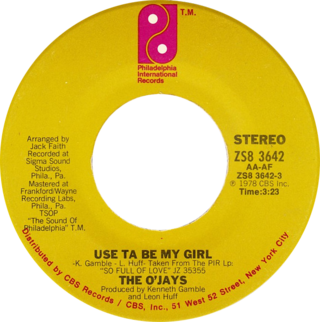
"Use ta Be My Girl" is a song by R&B vocal group The O'Jays. Released from their hit 1978 album, So Full of Love, it became a crossover hit. The song spent five weeks at number one on the R&B singles chart. It also peaked at number four on the Billboard Hot 100 singles chart. "Use ta Be My Girl" became one of the biggest and most familiar hits by The O'Jays. The song has also been certified by the RIAA as a million-seller.

"Love Is in the Air" is a 1977 disco song by Australian singer John Paul Young. It was written by George Young and Harry Vanda, and released as the lead single from Young's fourth studio album, Love Is in the Air (1978). The song became a worldwide hit in 1978, peaking at No. 3 on the Australian charts and No. 5 on the UK Singles Chart. In the United States, it peaked at No. 7 on the pop chart and spent two weeks at No. 1 on the Adult Contemporary chart, his only U.S. top 40 hit. The song plays at 122 beats per minute, a typical 1970s disco rhythm. At the Australian 1978 King of Pop Awards, the song won Most Popular Australian Single. In 1992, a remix of the song was released and featured on the soundtrack to the Golden Globe-nominated film Strictly Ballroom. A new music video was also produced.

Barbra Streisand's Greatest Hits Volume 2 is the second greatest hits album recorded by American vocalist Barbra Streisand. It was released on November 15, 1978 by Columbia Records. The album is a compilation consisting of ten commercially successful singles from the singer's releases in the 1970s, with a majority of them being cover songs. It also features a new version of "You Don't Bring Me Flowers", which was released as the collection's only single on October 7, 1978. Originating on Streisand's previous album, Songbird, the new rendition is a duet with Neil Diamond who had also recorded the song for his 1978 album of the same name. The idea for the duet originated from DJ Gary Guthrie who sold the idea to the record label for $5 million.
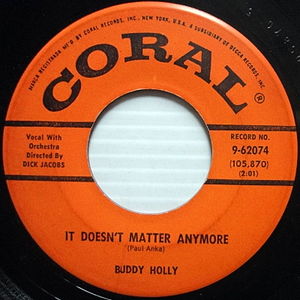
"It Doesn't Matter Anymore" is a pop ballad written by Paul Anka and recorded by Buddy Holly in 1958. The song was issued in January 1959, less than a month before Holly's death. "It Doesn't Matter Anymore" reached number 13 as a posthumous hit on the Billboard Hot 100 chart in early 1959, shortly after Holly was killed in a plane crash on February 3, 1959. The single was a two-sided hit, backed with "Raining in My Heart". "It Doesn't Matter Anymore" was Holly's last US Top 20 hit and featured the orchestral backing of Dick Jacobs. It was also successful in the United Kingdom, where it became the country's first posthumous number 1 hit.
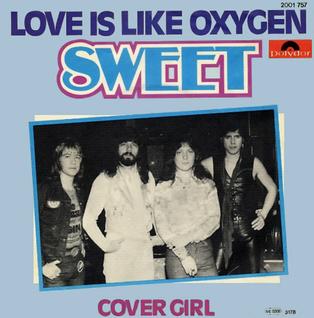
"Love Is Like Oxygen" is a song by the British band Sweet and released in January 1978. It was co-written by the group's guitarist Andy Scott, and Trevor Griffin, a musician who had played with various unsuccessful bands before becoming a roadie and sound engineer. The song was a departure from earlier recordings by Sweet, which were more guitar-driven, and featured high vocal harmonies. The extended album version of the song, which appeared on their album Level Headed, incorporates strings and has some disco elements.
The Official New Zealand Music Chart is the weekly New Zealand top 40 singles and albums charts, issued weekly by Recorded Music NZ. The Music Chart also includes the top-20 New Zealand artist singles and albums and top 10 compilation albums. All charts are compiled from data of both physical and digital sales from music retailers in New Zealand.
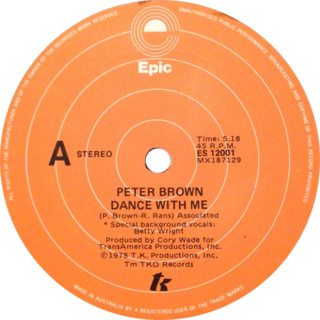
"Dance With Me" is a 1978 international hit single recorded by Peter Brown. It was the second release from his first LP, and became his greatest hit. Backing vocals were provided by Betty Wright along with her girlfriends Patricia Hurley and Wildflower.
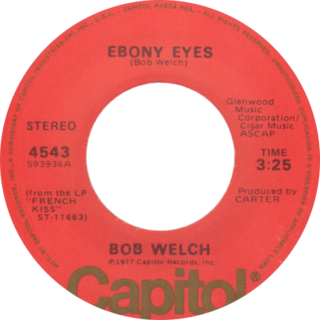
"Ebony Eyes" is a song written and performed by Bob Welch. The song was the second single release and second hit song from his album French Kiss. Backing vocals are provided by Juice Newton.

"So Sad (To Watch Good Love Go Bad)" is a song written by Don Everly, which was released by The Everly Brothers in 1960. The song was later a country hit for multiple artists in the 1970s and 80s.
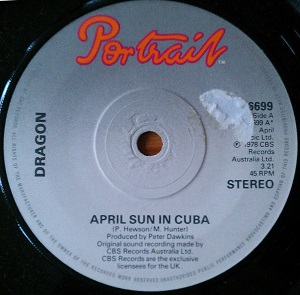
"April Sun in Cuba" is a song recorded by New Zealand group Dragon, released in October 1977. It is the first single to be released from Dragon's fourth studio album Running Free. "April Sun in Cuba" first charted on 7 November 1977, peaking at number 2 on the Kent Music Report Singles Chart and staying on the chart for 22 weeks. It also reached number 9 on the New Zealand singles chart. The b-side of the single, a non-album track called "Telephone", was credited to "Dr. Agony".
Richard Howard Purser is a New Zealand badminton player who has won 33 New Zealand national badminton titles, including the men's singles on nine occasions. He competed at four consecutive Commonwealth Games, from 1966 to 1978, and won the bronze medal in the men's doubles with his brother, Bryan Purser, at the 1978 Commonwealth Games.
Bryan Russell Purser is a New Zealand badminton player. He competed at two Commonwealth Games, in 1974 and 1978, and won the bronze medal in the men's doubles with his brother, Richard Purser, at the 1978 Commonwealth Games.